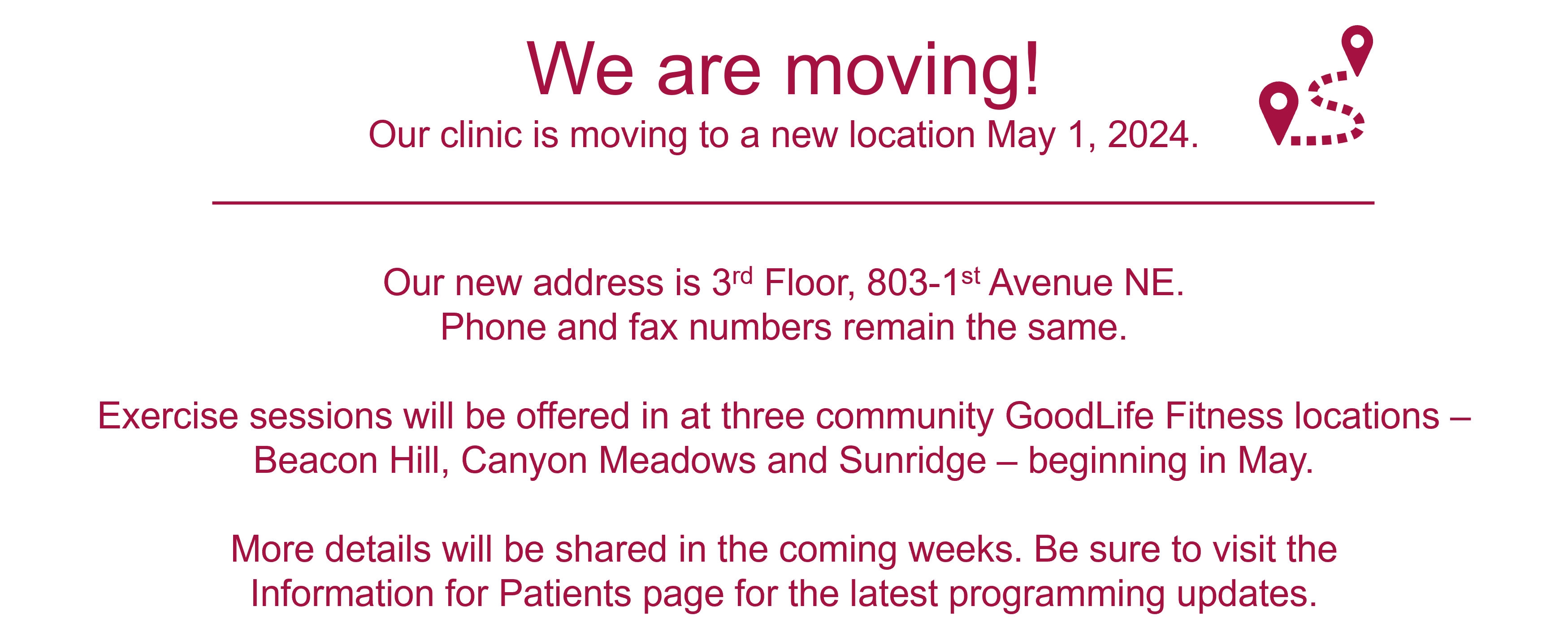
Online Resources for Heart Health
The resources in this library are designed to provide you with information and tools to help you manage your heart health. Your rehab team will encourage you to review these resources during your time in the program.
Click on any of the icons listed below to jump to the resources for that topic or simply scroll down the page.
Action Planning for Heart Healthy Changes
Forming healthy habits takes time. An action plan can be helpful in reaching your heart health goals. Start small by setting 1-2 actions each week and build on this baseline as you progress through the program.
Be Active | Exercise Resources

Information to Help You Safely Exercise
Simply click the down arrow to the right of each topic to view information and links.
Medications
Medications should be taken at least 1.5 to 2 hours before exercise. If you are prescribed nitroglycerin, remember to carry it with you. If you have questions about the timing of your medications, please speak to a healthcare team member. Avoid nicotine (patch, inhaler or cigarettes) and cannabis products 3-hours before and 1-hour after activity or exercise. Always bring an up-to-date copy of your medication list with you.
Temperature
Avoid outdoor activities in extreme heat or cold as these temperatures make your heart work harder. Remember to dress appropriately for the weather and activity (e.g. layers, sunscreen, hat). Choose breathable fabrics that wick away sweat and help to regulate body temperature. Dress in lighter layers versus heavier ones. Avoid saunas, hot tubs, or hot showers after activity or exercise. Your body temperature rises during activity, so it is important to consider the temperature for your activity. If indoors, you may consider opening windows or placing a fan nearby.
Food and Water
Always carry water with you to keep hydrated before, during, and after activity. Eating a well-balanced meal 2 hours before activity is ideal. If this is not possible, eat a small snack 20-30 minutes before (e.g. fruit, nuts/seeds).
Intensity
During any activity you should always pass the Talk Test (i.e. speak 5-6 words comfortably). If you can only speak one or two words and are gasping for air, you are working too hard. Refer to section 2 of the Guide to Exercise for a refresher on how to monitor intensity.
Symptoms
Avoid activity during illness or infection. If you feel lightheaded or dizzy, have any symptoms or feel uncomfortable, stop what you are doing and sit down. Drink some water. If you experience any chest pain or discomfort, stop what you are doing, sit down and call 911. Follow the nitroglycerin protocol if you are prescribed nitro-spray.
Always speak with your clinical exercise physiologist before starting/progressing your strength training or if you have safety concerns.
Important Safety Considerations
Always speak with your clinical exercise physiologist before starting/progressing your strength training or if you have safety concerns.
Progressing Strength + Resistance Training Guide (pdf)
You may be asked to avoid strength training if you have:
- Muscle or bone issues
- Hernia
- Unrepaired aortic aneurysm
- Uncontrolled high blood pressure
- Or other safety considerations identified to you.
What to look for
- Beginner classes, restorative/relaxation, therapeutic classes
- Hatha, Yin, Iyengar (beginner), Nidra (meditation)
Avoid
- Hot or heated classes
- Postures where your head is below your heart for a prolonged period of time (e.g. downward dog - hold for 2-3 breaths only)
- Postures where you are holding an engaged position (e.g. plank - keep moving)
- Postures that cause pain
- Styles such as Hot, Power, Flow, Vinyasa, Ashtanga, Moksha, Bikram
Special considerations
- Osteoporosis/Osteopenia - avoid excessive spine movement (flexion/rotation)
- Hip Replacement - avoid excessive hip movement (internal/external rotation)
- Sternotomy (open heart surgery) - wait 8-12 weeks before starting
- Knee Replacement - use caution with kneeling
- Postural Hypotension (low blood pressure) - elevate head if lying down, change positions slowly and avoid quick changes in posture
If you had open heart surgery, please speak to your surgeon about your sternal (chest) stability before playing golf.
General Information
- Aerobic exercise and core training will reduce your risk of injury and increase your performance.
- Strength, balance, and flexibility training will improve your balance, coordination, and power.
Avoid
- Carrying your clubs until you build your strength.
- Walking the course until you build your fitness level.
Starting back safely
- Start with riding a cart, gradually progress to walking 9 holes, then walking 18 holes.
- Walk the course but have a partner carry your clubs on the cart.
- Pull your clubs using a pull cart for 9 holes, and progress to 18 holes after a few weeks.
- If you feel good, you can progress to carrying your clubs.
General Information
- Always hike with a partner or in a group.
- Pack snacks and bring 1-2 litres of water with you.
- Check hiking trail difficulty.
Avoid
- Exercising at a somewhat hard/moderate intensity (talk test/ratings of perceived exertion scale), or at your target heart rate, for longer than 1-hour. For hikes longer than one hour, stay in the light intensity zone.
- High altitudes until you are comfortable with exercise at low altitudes. Altitude can increase your heart rate and make your heart work harder.
Equipment + Clothing
- Trekking poles or old ski poles makes walking easier and more enjoyable.
- Wear multiple light layers rather than a few big heavy ones.
- Wear good, supportive shoes when hiking.
General Information
- Shoveling is double duty on your body and heart because it tries to keep you warm and meet the demands from heavy lifting.
- The combination of your body's response to cold weather and high demands of lifting can increase the risk of a heart event.
Avoid
- Smoking, caffeine, and eating before shoveling
- Breathing in cold air directly (cover your mouth with a scarf)
- Straining
Safety considerations
- Avoid "throwing" the snow.
- Use smaller shovel and take off 2-inches at a time.
- Take breaks and only clear necessary paths.
- Pay attention to your signs and symptoms.
- Contact snow removal programs in your neighbourhood or community.
Your Heart Health | Risk Factor + Medication Resources

Frequently Asked Questions
It is normal to have questions about your health following a heart event, surgery or diagnosis. Listed here are some of the most common questions participants have when first starting out in the program.
The time will vary depending on the type of license you have, the type of heart event you had, and your specific heart condition. Please talk to your doctor about when it is safest for you to resume driving.
If you are a commercial driver, you will likely not be permitted to drive for at least 3 months after having had a heart attack or heart surgery. Please talk to your doctor if you have any questions.
Back to work decisions are based on the type of work you do, your heart function and symptoms after your heart attack, event or type of surgery. Your family doctor usually coordinates your return to work using information from your hospital records, follow-up from your cardiologist, and results from any diagnostic tests, including your exercise stress test and rehabilitation progress reports. Although the cardiac rehabilitation program does not complete insurance forms, it does provide your family doctor with information that can be used in the decision-making process.
After a heart attack or heart event, it is important to protect yourself from developing conditions which lead to inflammatory responses in your body, such as a common cold, flu, or pneumonia. Getting your annual flu shot, in addition to proper sleep, a healthy diet and physical activity, is your best protection against illness.
Several studies have shown that patients with a heart condition who get the influenza vaccine have fewer heart attacks. For more information on influenza, visit www.albertahealthservices.ca/influenza./
This will be determined by your family doctor and depends on your heart function, length of travel, and your mode of transportation (e.g., airplane or by car).
If you are considered clinically stable to travel by your doctor, please ensure you take the necessary steps to get adequate travel insurance. Most insurance companies will require that you have stable medications for a minimum of 3-6 months (depending on the insurance company) before they will insure you for travel outside the country. Please consult your insurance company to confirm this information. You must let your insurance company know that you have had a heart attack or heart event, when your last change in medications was, as well as any procedures or treatments you’ve had.
It was once thought that alcohol may be protective for heart health. However, updated research shows it does not provide any protection. In fact, alcohol consumption increases cardiovascular and chronic disease risk. As a result, Canada has updated their guidelines on alcohol intake related to health risk:
- 0 drinks per week - no risk
- 1-2 standard drinks per week - low risk
- 3-6 standard drinks per week - moderate risk
- 7+ standard drinks per week - increasingly high risk
A standard drink is:
- 12-ounce bottle of beer
- 5-ounce glass of wine
- 1.5-ounce shot of spirits
Many patients who have had a heart event worry about whether or not it is safe for them to resume sexual activity. The maximum heart rate during usual sexual activity is similar to other daily activities such as walking or climbing two flights of stairs and is usually safe for low-risk patients.
If you have no symptoms during your exercise stress test and if the doctor tells you that you can start exercise, then it is likely safe for you to resume sexual activity.
If you have not had your exercise stress test but you are able to climb two flights of stairs without symptoms, talk to your doctor to decide if it is safe for you to resume sexual activity.
If you cannot start exercise based on your exercise stress test results or for ongoing symptoms, check with your doctor to see when you can resume sexual activity.
After a stent placement, it is generally recommended to wait four to six weeks before having any dental work done, including teeth cleaning, unless your cardiologist advises otherwise.
Antibiotics are not necessary with stents. For patients with various heart valve problems, including artificial heart valves, congenital heart disease and those who have previously experienced endocarditis, antibiotics are needed prior to having dental work and some other medical procedures done and should be discussed with your cardiologist.
Every patient’s medical history is different and therefore this issue needs to be addressed on an individual basis by your cardiologist in consultation with your dentist. Stopping these medications can be dangerous for some patients.
In most circumstances, you will be on some medications long-term to prevent the progression of heart disease and another heart attack or heart event.
Your family doctor is responsible for monitoring your prescriptions and providing medication refills after you have been discharged from the hospital. Your family doctor will also receive recommendations from the cardiologist who saw you in hospital. However, during the first 12-weeks of the rehabilitation program, your heart medications may be adjusted by our program doctors as needed (depending on your response to these medications). Our program doctors will provide your family doctor and cardiologists with your exercise stress test results and any medication recommendations based on these tests.
There are many resources available to help you quit smoking. Here is a list of options:
- Albertaquits.ca – provides many options to help Albertans quit smoking
- Pharmacy – many pharmacist are trained in smoking cessation
- TotalCardiology program doctors and nurses – can help with getting started on smoking cessation within the 3 months from cardiac event.
- Your family doctor – many family doctor’s clinics have resources for quitting smoking and can provide guidance on medications
Manage Stress | Emotional Health + Sleep Resources

Eat Well for Heart Health | Nutrition Resources

Common Questions About Diet and Heart Health
Click the categories below to view information for that topic.
Is alcohol good for heart health?
It was once thought that alcohol may be protective for heart health. However, updated research shows it does not provide any protection. In fact, alcohol consumption increases cardiovascular and chronic disease risk. As a result, Canada has updated their guidelines on alcohol intake related to health risk:
- 0 drinks per week - no risk
- 1-2 standard drinks per week - low risk
- 3-6 standard drinks per week - moderate risk
- 7+ standard drinks per week - increasingly high risk
A standard drink is:
- 12-ounce bottle of beer
- 5-ounce glass of wine
- 1.5-ounce shot of spirits
However, alcohol consumption is not advised with some medication. Please check with your pharmacist if you are advised to restrict alcohol consumption.
Is it okay to have caffeine?
Unless your doctor has recommended against it, you can safely have up to 300 mg a day of caffeine – about the amount in 2 cups (16 ounces or 500 mL) of coffee.
However, even small amounts of caffeine may interfere with sleep for some people, and good sleep is important for heart health. Remember to avoid caffeine three hours before and one hour after exercise, including an exercise stress test.
Is sea salt better than table salt?
Both sea and table salt are mostly sodium chloride, containing similar amounts of sodium. Sea salt is often marketed as healthier because of its mineral content, but the amount of such minerals is so small it doesn't have a positive effect on health.
You may prefer the taste or texture of one over the other. Both should be used in moderation.
What about coconut oil?
Coconut oil is promoted for everything from weight loss to Alzheimer’s disease. Unfortunately, there is little research to back up these claims.
We do know that coconut oil raises low-density lipoproteins or LDL cholesterol levels, so suggest limiting its use. Extra virgin olive, canola, and other oils containing mostly unsaturated fats are preferred for heart health.
Should I choose butter or margarine?
Small amounts of butter or margarine are not likely to make much difference one way or the other. Butter is rich in saturated fats, which raise LDL cholesterol, whereas most margarine today is primarily unsaturated fat, which helps lower LDL cholesterol.
In the past, margarine contained harmful trans fats, which were banned from the Canadian food supply in 2018. Today’s margarine is non-hydrogenated and the heart healthier choice. However, if you prefer butter, that’s fine too, ideally in small amounts. When possible, use a healthy fat like olive oil or natural peanut butter instead.
Should I choose sugar substitutes over sugar?
Choosing sugar substitutes such as aspartame, sucralose, and Stevia can help to reduce sugar in the diet. However, all sweeteners, including natural ones like Stevia, are highly processed and primarily found in highly processed food products such as pop, candy, and cookies. If possible, try to limit highly processed foods and reduce both sugar and sugar substitutes in the diet.
Is it okay to take supplements?
We suggest discussing all supplements, including vitamins and herbal remedies, with your healthcare team. Some products can interact with your medications or cause harmful side effects. Unfortunately, research into many natural products is limited.
The Poison And Drug Information Service (PADIS) is also available to answer questions about how supplements and complementary medicines interact with your prescription medications, 24 hours a day, 7 days a week. You can reach their pharmacists and/or nurses by calling 1-800-332-1414.
Should I take fish oil (omega-3) supplements?
Omega-3 supplements are generally not recommended to reduce risk of future heart problems. Usually the best way to get your nutrients is by eating whole foods, and fish is no exception.
Do I need a protein powder to meet my protein needs?
Many people worry that if they reduce their meat portion or choose more plant-based proteins they won’t get enough protein. However, by filling ¼ of your plate with protein foods and choosing a variety of protein options at each meal and snack, most people can meet their protein needs through food alone.
Protein powders can be a convenient option, but whole foods are preferred because they give you more vitamins, minerals and other nutrients. If you do buy protein powder, be sure to check the product’s sugar content. Other convenient, nutritious protein boosters include Greek yogurt, peanut butter, or hemp seeds.
I want to lose weight. How much should I aim for and how should I change my diet?
A common goal coming into cardiac rehab is weight loss. However, while diets for weight loss work for some people in the short term, research shows that most people regain the weight within 2-5 years. Stalled weight loss or weight regain is discouraging and often causes a return to previous habits. Shifting the focus from weight loss to health behaviour change allows you to develop long-lasting, health-boosting behaviours.
Focus on changing dietary and lifestyle habits one at a time – allowing each change to become habit before moving onto the next. This will help provide lasting benefits to your health and ultimately be better for helping you to feel better and live longer. If you’re struggling to make sense of weight loss versus behaviour change, speak with your rehab team, family doctor, or a dietitian.
Should I consider a diet plan like ketogenic diet or intermittent fasting?
Any diet plan that restricts categories of food or times in which you can eat may result in short-term weight loss. However, weight regain is likely and these diets may impair your ability to eat mindfully, find satisfaction in food, and regulate your hunger/fullness.
The ketogenic diet restricts entire categories of foods including fruit, whole grains, and legumes which have been proven to help prevent and protect against heart disease. Instead of focusing on what to cut out of your diet, focus on what you can add in!
How can I prevent weight gain when I quit smoking?
After quitting smoking many people experience an increased appetite and, as a result, weight gain. Research shows that the benefit obtained from quitting smoking outweighs any risk you might add by gaining some weight.
If you’re concerned about weight gain after quitting smoking, ask a member of your rehab team or the program dietitian for support.
Why is nutrition information always changing?
Nutrition science is complicated because we do not eat foods in isolation and how or what we eat is affected by other factors including stress and sleep (which are also risk factors for many chronic diseases). As more research is done, our understanding of nutrition evolves and small shifts in recommendations and guidelines occur.
Adding to the confusion, many online sources sensationalize or misinterpret nutrition information to create headlines or sell products. When reading nutrition information, take time to ask yourself these questions:
- Is it written by a nutrition expert (i.e., a registered dietitian)?
- Are they trying to sell a product, increase readership, etc.?
- Is the article discussing a single study or considering the entire body of evidence?
Go to organizations such as Dietitians of Canada, Heart and Stroke Foundation or the American Heart Association for trusted advice.
I’ve heard eggs are high in cholesterol, should I avoid them?
For a long time, guidelines suggested strictly limiting eggs in the diet due to their high cholesterol content. However, we now know that, for most people, dietary cholesterol has a limited impact on blood cholesterol levels. While some studies suggest that people who eat a lot of eggs experience more heart problems, particularly if they have diabetes, the evidence is not conclusive.
Eggs are a nutritious, convenient, and affordable protein source that can be chosen as one of your protein options.
Should I avoid fish because of mercury?
For adults with heart concerns, the benefits of fish far outweigh the risk of consuming too much mercury. To limit your intake of mercury and other potential contaminants, you can vary the fish you eat, limit your intake of high mercury fish (e.g., fresh/frozen albacore tuna, shark and swordfish), and eat no more than 4-5 servings of fish a week.
If you are or might become pregnant, are breastfeeding, or are feeding young children, limiting mercury is more important, although most commonly consumed fish are low in mercury.
